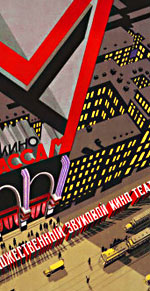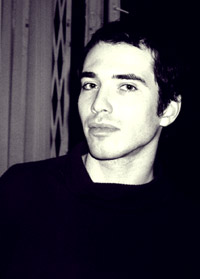
| Jacket 36 — Late 2008 | Jacket 36 Contents page | Jacket Homepage | Search Jacket |
This piece is about 7 printed pages long. It is copyright © Kiril Medvedev and Peter Golub and Jacket magazine 2008. See our [»»] Copyright notice. The Internet address of this page is http://jacketmagazine.com/36/rus-medvedev-trb-golub.shtml

Back to the Russian poetry Contents list
* * *
dismayed I understood
that I cannot appease a single person
there are those who can appease me
one or two people
who have nothing to do with literature;
and I cannot appease anyone
also I seem to be unable to describe
physical pain
how exactly does your head feel
asks my mother
describe your pain
she says
after all
you’re a writer
and I can’t
describe my own physical pain
much less the pain of others’
and am unable to
calm anyone
George Ivanov wrote about this sometime ago
that writers can no longer appease anyone
I think maybe they can do
something else
(entirely possible)
though honestly I don’t know what
just not this
for some reason literature has gone far away from the reader
for he needs someone to describe his suffering
he needs
to laugh or be frightened
and at times
appeased
literature has betrayed the reader
or maybe it’s the other way around — the reader has betrayed literature —
he’s traded it for base entertainment
cheap adventures
commutation
politics mysticism
psychology
computer
cinematographer
dance of Saint Vitus
wild spasms of the damned
at the edge of the inferno
Valley of Hinnom
I think
a mutual betrayal has taken place
* * *
just a bit more on literature:
I’ve been interested
in a certain type of poet
this is a rather well known type:
fair skinned lads
who came moscow
beginning with the nineteen thirties
got into the gorky institute
and had their binges at the dorms
of the institute
these were
very hardboiled boys from the periphery
masters of nostalgia
enigmatic laymen
it seems to me
that the demand for these guys was huge
because
they presented with themselves
a living conscience
to the aged poets of the capital
lodging in an eternal complex before the people
it seems to me
that they really wanted
to fill the vacant niche
such
village troubadour
longsuffering in the city;
I think
that they also really wanted
to try out the gypsum mask of Lel’
dozens of them
lost their minds
many turned
into bums
and to this day
beg
around strastnoi boulevard
(several times I’ve been there
and seen these overgrown muzhiks
who walk along the benches
reading poetry
saying that they are former students
of the gorky institute)
some of these guys hung themselves
the rest vanished into obscurity;
the most famous of these
of course
is nikolai rubstov
although it’s well known
that rubstov wasn’t all that simple
that he lived for a while in petersburg
where he hung out with the petersburg aesthetes
and experimented
with various formalist approaches
that he likes Brodsky
and so on
I think
everyone knows
that upon his arrival in moscow
he was roped in
these apiarists
from the lit institute
it seems to me
that they shoved him
into the frame of a odious myth
destroying him with it
and put out for exhibition
a straw scarecrow in the pantheon
to this day
one can find
these type of guys
* * *
jungle
trance
house
ambient
rhythmic electronic music;
strange music
casting a cool wave of comfort;
I don’t love
it;
I sometimes like
to work
to this music
but how a person can actually love it
is beyond me
(on the other hand I understand
that even water dripping from some pipe
can be loved more than one’s own children —
entirely possible, for instance
what if I was a musician and played
contemporary industrial music,
and I also had a child, than I would love
watering dripping from a pipe
more than my own child)
or maybe, I’d hate it
more than my own child
sometimes it seems
that I hate
the entirety of this new reality
this entire new generation
these children of perestroika
I hate them because
they’re all the same
like small monkeys
in connection with this
I remember that
when
during the war in Abkhazia
when the Georgian army entered Sukhumi
the Georgian soldiers
shot all of the monkeys
at the zoo
which at that time had a large colony
it is probably still there
except that now they’ve probably
shipped in new monkeys
I lived there as a kid
from two to nine years of age
for about six months a year
from the middle of spring to the middle of fall
it was a very large colony
I often went to walk there
with my grandmother
I knew practically every animal by face
besides the zoo
we also went to the sea
and I remember how once
I saw a boy
sitting on the shore
he was about my age
and I must have been
four at the time
from the sea he pulled shells
and from the shells oysters
eating
them raw
I stood
watching him for a long time
you know there are events that you remember
and it seems that something switched then
in that situation
you felt something
though in actuality you understand
that never, not then or after
nothing ever changed
and you felt absolutely nothing
not at that moment nor a thousand like it
a little while ago
about two years
we were on the subway
and across sat
two short degenerates
in yellow uniforms
pizzeria or
baseball or something
they were eating popcorn
and then threw the boxes
out the window,
children of prosperity
these were the children of prosperity
and we too
are children of prosperity
who’s going to help us
to bear the shame of this prosperity
give us
our popcorn
and send us
to some
more or less safe war
ewwwwwwwwwwaaaaaaaaaaa
a dead cat
lies on the sidewalk
not unlike
a deflated ball
ewwwwwwwwwwaaaaaaaaaaa
wrote four poems
one —
about death
the other —
about god
the third —
about this cat
the fourth —
about some other thing
here it
is

Kiril Medvedev
Kiril Medvedev (b. 1975 Moscow) is a poet, translator, and essayist. He graduated from the Gorky Institute of Literature, where he studied
translation. As a translator he has focused on the works of Charles Bukowski,
publishing translations of Bukowski’s prose, poetry, and letters. He has
also translated Lawrence Durrell and John Ridley. He has published four books of
poems including All is Not Well (2002). He was short-listed for the
Andrei Bely Prize in 2002.